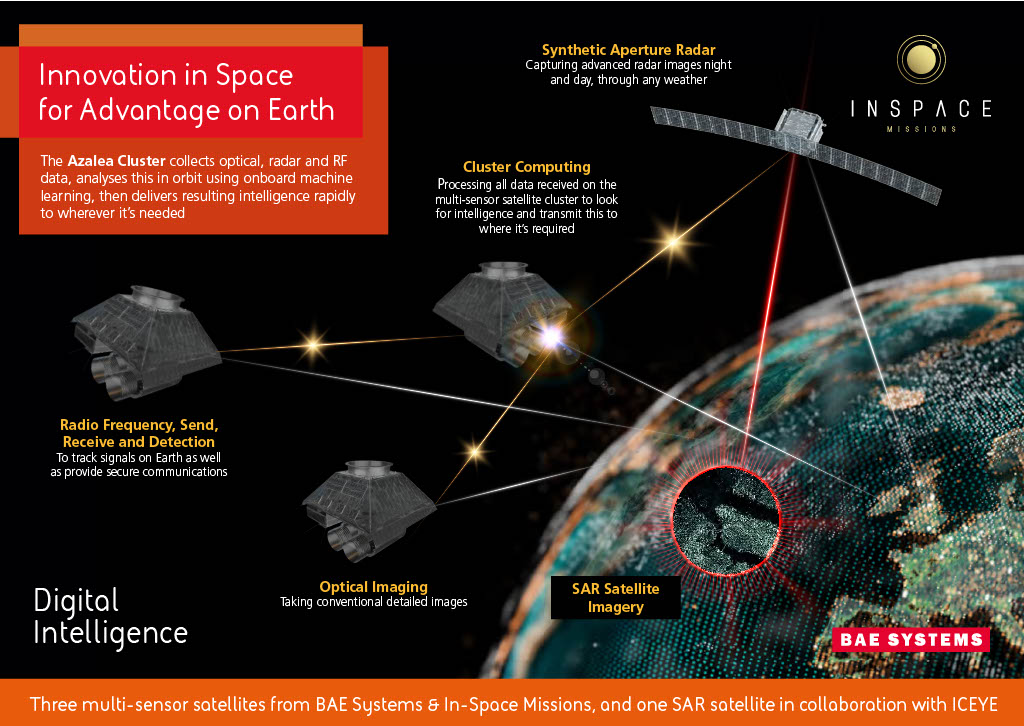More Partners for Asia-Pacific BAE Systems’ InSpace Digital System
BAE Systems’ In-Space Missions is seeking more partners and collaborators in the Asia-Pacific region for the InSpace Digital system, launching in 2024, to trial payload applications that can be run on the ground or uploaded (or both) and make use of a unique combination of data from multiple optical payloads, Synthetic Aperture Radar and an RF multi-band and wide band collect system.
In-Space Digital is a reprogrammable multi-sensor system of four satellites that can be repurposed for different applications and commercial use. It can be reprogrammed to use multiple optical payloads and the RF multi-band and wide band collect system on three of the spacecraft, along with the SAR payload on the fourth, to generate pre-processed results to deliver value added data or actionable information to users. The system includes inter-satellite links between the spacecraft, precision timing and metrology and inter-satellite links via GEO for low volume data and tasking.
“For many years, we have actually supported space-based research. For organisations like the European Space Agency in some of their long-range mission probe, we have provided extremely accurate timing and positioning information for deep-space applications. More recently, BAE Systems have invested in (micro satellites for) low earth orbit, particularly focusing in the defence sector.
In-Space Digital is the name of the civil and commercial service that will be offered from the Azalea mission, which was announced by BAE Systems in 2022. The Azalea / In-Space Digital mission is a multi-sensor satellite cluster that will be launched into low Earth orbit in 2024 to deliver high-quality information and intelligence in real time from space to civil, commercial and military customers. In-Space Missions, as part of BAE Systems, will provide the capability to design, build, launch and operate the satellites
“Our satellites operate in a cluster of four, and all four can communicate with each other all the time. That permits us to do different things in space, processing faster than they normally do on land which takes much longer to do on for different platforms.
“The cluster of satellites comprise three with imagery capability, electronic surveillance capability and communications capability, while the fourth has synthetic aperture radar (SAR). Last week, In-Space Digital announced that it has received some UK government funding to promote this throughout South East Asia,” BAE’s Asia-Pacific Business Development lead Barry Johnson told Asian Defence Journal at Cyber Defence and Security Asia expo and conference (CyberDSA 2023) event in Kuala Lumpur, Malaysia. BAE Systems is among the largest participants.
On Aug 8, In-Space Missions was awarded a grant from the UK Space Agency’s International Bi-lateral Fund to develop Faraday Dragon, the first Asia-Pacific regional and multi-agency technology and business accelerator programme created to provide regular in-orbit payload rideshare missions.
The matched fund grant will enable In-Space Missions to set up the collaboration framework and develop the mission definition for Faraday Dragon with partners in the region, working towards the design, build and launch in 2026 of the first in the series of rideshare missions.
Faraday Dragon Regional Satellite Rideshare Mission
In-Space Missions Ltd also plans to partner with more Southeast Asian nations to initiate Faraday Dragon, an Asia-Pacific regional satellite rideshare mission targeted for launch in 2025. Faraday Dragon will fly multiple payloads for regional space players including government, commercial, financial, research and educational organisations.
Currently, In-Space Missions, which is owned by BAE Systems, is collaborating with with Singapore Space Technologies Ltd (SSTL) on a service-orientated model which aims to support and develop satellite assembly and payload integration capabilities in the Asia-Pacific region.
“The Faraday Dragon rideshare mission is designed to contribute to the regional eco-system by bringing multiple payloads together on one satellite platform to provide a more cost-effective and sustainable ride to orbit for pre-cursor missions, early service rollout, technology demonstration, and in-orbit flight qualification of new technologies. Our customers will be able to access the performance of a 150kg class small satellite for a fraction of the cost of traditional flight services as well as access our in-orbit ‘Digital’ system to take advantage of coherent multi-sensing and processing,” said Tony Holt, Chief Sales Officer for In-Space, in a conference earlier this year.
The Faraday Rideshare satellite platform and service capability has been developed by In-Space Missions, with support from the UK Space Agency, to provide a full turnkey system for enabling diverse organisations to get payloads into space at a very competitive price that cannot be achieved using a dedicated satellite solution. The platform design includes innovative on-board processing to deliver sophisticated, flexible and re-configurable data from multiple sensors on board the spacecraft, providing the potential for a rich flow of data from new technologies for the downstream sector.
Value added services from Faraday Dragon could also include on-orbit processing (edge processing), subsequent timely delivery of actionable information to a user community and a full end-to-end service to customers that includes payload operations support, satellite bus operations, payload tasking and download of data via a Customer Data Portal. –adj/ar/mgm (Pix: BAE Systems)


